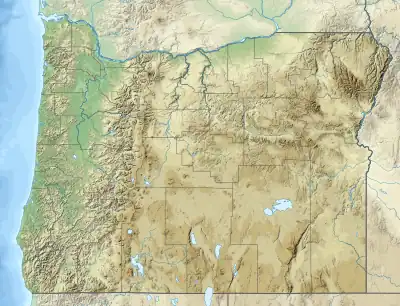| Burnt River | |
|---|---|
_(bakDA0050a).jpg.webp) Flowing through Burnt River Canyon | |
 Location in the United States  Location of the mouth in Oregon | |
| Etymology | Either burned timber along its banks or burned-looking rocks along its course[1] |
| Location | |
| Country | United States |
| State | Oregon |
| County | Baker |
| Physical characteristics | |
| Source | Blue Mountains |
| • location | near Unity, Oregon |
| • coordinates | 44°30′15″N 118°10′51″W / 44.50417°N 118.18083°W[2] |
| • elevation | 3,824 ft (1,166 m)[3] |
| Mouth | Snake River |
• location | near Huntington, Oregon |
• coordinates | 44°21′54″N 117°13′34″W / 44.36500°N 117.22611°W[2] |
• elevation | 2,073 ft (632 m)[2] |
| Length | 98 mi (158 km)[4] |
| Basin size | 1,090 sq mi (2,800 km2)[5] |
| Discharge | |
| • average | 131 cu ft/s (3.7 m3/s)[6] |
The Burnt River is a 98-mile-long (158 km)[4] tributary of the Snake River in eastern Oregon, United States. It enters the Snake near Huntington at a point upstream of the Powder River and downstream of the Malheur River, slightly more than 327 miles (526 km) from the Snake's confluence with the Columbia River.[7] Draining 1,090 square miles (2,800 km2), it flows predominantly west to east.[8]
The river begins at Unity Reservoir at the confluence of the North, West, Middle, and South forks of the river. The reservoir is slightly east of the Wallowa-Whitman National Forest in the Blue Mountains and slightly north of Unity. Unity Lake State Recreation Site adjoins the reservoir. As it leaves the lake, the river flows under Oregon Route 245, then runs east through the upper Burnt River Valley past Hereford and Bridgeport and, through the Burnt River Canyon, to Durkee. Turning generally southeast at Durkee, the river runs along Interstate 84 past Weatherby, Dixie, and Lime before flowing under the Interstate and turning east again. Shortly thereafter, it passes Huntington and reaches the Snake.[8]
See also
References
- ↑ McArthur, Lewis A.; Lewis L. McArthur (2003) [1928]. Oregon Geographic Names (7th ed.). Portland: Oregon Historical Society Press. p. 129. ISBN 0-87595-277-1.
- 1 2 3 "Burnt River". Geographic Names Information System (GNIS). United States Geological Survey (USGS). November 28, 1980. Retrieved February 28, 2011.
- ↑ Source elevation derived from Google Earth search using GNIS source coordinates.
- 1 2 U.S. Geological Survey. National Hydrography Dataset high-resolution flowline data. The National Map Archived 2012-03-29 at the Wayback Machine, accessed May 3, 2011
- ↑ "Bull Trout Recovery Plan: Columbia River/Klamath (2002), Chapter 13: Hells Canyon" (PDF). United States Fish and Wildlife Service. p. 2. Retrieved February 28, 2011.
- ↑ Palmer, Tim (2014). Field Guide to Oregon Rivers. Corvallis: Oregon State University Press. p. 275. ISBN 978-0-87071-627-0.
- ↑ United States Geological Survey (USGS). "United States Geological Survey Topographic Map:Olds Ferry, Idaho, quadrangle". TopoQuest. Retrieved February 28, 2011.
- 1 2 Oregon Atlas & Gazetteer (Map) (1991 ed.). DeLorme Mapping. § 82–83. ISBN 0-89933-235-8.